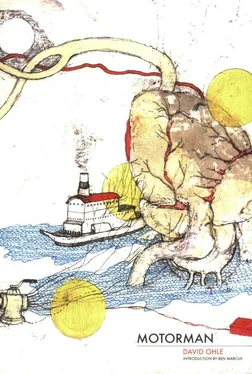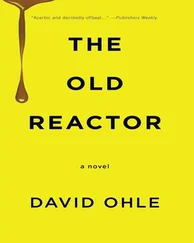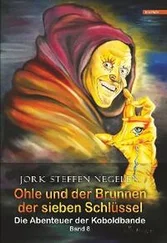"Burnheart, I may have broken an unwritten rule of some kind. I'm not sure."
"Well, then. If you're not sure, how can I be sure? How can we talk about it? Tell me more, Dinky."
"I think I opened up a couple of Bunce's jellyheads. But I'm not sure."
"You're not sure?"
"No, I had been chewing stonepicks. I was seeing and feeling through cotton. I'm not certain."
"I've told you about stonepicks. Say I haven't."
"You have."
"You had one in your mouth when I came in. Say you didn't."
"I didn't."
"So you opened a pair of jellies?"
"Yes, maybe I did. The recollection is full of holes."
"But there is a recollection?"
"Yes, I woke up with it. It was strong. I checked my clothes, my vehicle. There was definitely jelly, and those nibs."
"What did you do it with?"
"I may have done it with my letter opener."
"May I see it?" Moldenke gave him the letter opener, a simple chrome affair with swirls. He smelled it, touched it, gave it back. The cigars were halfway done. "I'd say you did it, or someone did it with your letter opener, wearing your clothes, and driving your vehicle. One or the other. I'm afraid I don't know what to say, Dinky. Bunce has a great deal of pull."
"Help me, Burnheart."
"I don't know, Moldenke. I just don't know. All I can do is be your friend. I'm only a scientist. I have my limits."
"Should I run?"
"I'd sit still for a while."
"What should I do?"
"I'd do nothing for a while."
They blinked, coughed. The cigars wore down. Burnheart went to the lookout. "There it is. The city. The rooftops of the city. Back in the city again. My mood is changing sooner than I expected it would. I'll have to head back toward the country."
"Burnheart. Stay longer."
"No. I have experiments to run, rats and rabbits to feed. You know the game."
"Are you leaving now?"
"Yes. I only came to bring you a letter I'd written and forgot to mail. I thought I'd deliver it personally as long as I was in the city. It may be the last time I'm here. My city moods come less and less often these days, and this one feels final." He gave Moldenke a letter. "It may be a little out of date, as they say."
"I'll read it anyway."
"Well, Dink. I'll be seeing you. If you need my advice about anything, give me a call. Don't flounder around uncertain about things. Call me."
"Are we friends, Burnheart?"
"Straight on, Dink. Double-clutching heart-mates. I'll see you around." He left, closed the door softly behind him.
23
He dialed 555-333-5553355-333-
"Fernberg's Clock & Hock, Bunce on the line."
"Mr. Bunce?"
"Yes?"
"I thought I'd call and sort of feel things out."
"Who is this?"
"Moldenke."
"Oh, Moldenke. I didn't recognize the voice. Throat polyps, is that it? You shouldn't be breathing so much, boy. Wear the gauze pads. Wear the gauze pads. Why do you think we give them to you? What do you want? I'm a busy man this season."
"Like I said before, I thought I'd call and sort of — "
"I heard it the first time. Explain yourself."
"Well, there really isn't too much in the way of things to explain, Mr. Bunce. I suppose, if you have to say something, say I'm testing. Throwing out my bait."
"Don't tell me what to say."
"I didn't."
"Don't."
"I won't."
"The future lies ahead of us, boy, hanging there like a thunderstorm. Make yourself a shelter. Quit gassing, stop your aimless pissing-off. Collect things. Pull your coats tight. Get ready."
"Mr. Bunce?"
"Yes?"
"Suppose, in a few minutes from now, suppose I get up from this chair and walk to the door, open the door, step into the hall, walk down the stairs, through the main gate, and out into the street. What then?"
"Don't bother, champ. You won't get past the open door part. I've got a man in the hall. You won't make it. Stay with the chair."
"I'm beginning to itch."
"He's beginning to itch."
"Sores on the underthigh."
"Sores on the underthigh, he says."
"I'm not very comfortable with these restrictions."
"He's not very comfortable. Moldenke! You gutted two of my very best street workers. You expect comfort, you expect to be left alone? Moldenke?"
"What?"
"Look at the palm of your left hand."
"I can't. The lights are out."
"Wait a second. I'll turn them on for a minute." The lights flickered and went on. Moldenke stood up, legs stiff, bloodless. He sat back down. The refrigerator hummed. The radio went on, the heater grille twittered like a redbird. Feet shuffled on the carpet in the hall. Somewhere in the building unit a toilet flushed.
"Did you do that, Bunce? Did you make the lights go on? Is my electricity somehow flowing through the Fernberg Clock & Hock?"
"Look at the left palm, Moldenke." He looked at the palm.
"Okay, Bunce. I'm looking. Now what?"
"Are you looking at it closely?"
"As close as I can under the circumstances."
"What are the circumstances?"
"Mucus collecting in one of the eyes. It's all but cemented shut."
"Wear the goggles, boy. Why do you think we give you goggles? Now, hold the palm up there and look twice as hard." Moldenke did that. "Are you looking hard enough?"
"I'm looking. I'm looking."
"Pay attention to surface conditions, qualities of the skin, stuff like that."
Moldenke studied the palm. The lights surged, the radio went louder. Outside, the wind picked up. The door of the refrigerator opened and swung back on its hinges. A weather report came on the radio:
Possible dry storms in the bottoms area, reports not confirmed, estimates of high winds, gauzemen working overshifts, nothing official, stay tuned, remain calm. .
"Did you hear that, Bunce?"
"Yes, I heard it. It was a good one. I liked it. What about the palm? Have you looked at it sufficiently?"
"Yes, I think so."
"Good. Now, look at the pocket on the hip matching that palm you just looked at so intently." Moldenke looked at the left pocket, examined it.
"Examine the pocket, Moldenke."
"I am. I am." He saw grease, hanging strings, and dirt. "Good. Tell me what you see." Moldenke told him what he had seen. "Fine. Look at the palm again." He looked at the palm again. "Have you looked?"
"Yes."
"Perfect. Now, put the palm in the pocket, along with the hand." He put the hand in his pocket, along with the palm. "Is it in there good?"
"Yes. It's not so easy sitting down."
"Good enough. Now, take it out." He took it out.
"Is it out?"
"Yes. It's out."
"Excellent, boy. Now, tell me what you've learned from this."
"I suppose I've learned that the palm remains while the pocket wears away. Skin regenerates, cloth is a oneway business. Something like that. I learned something along those lines. Am I right?"
"Close enough, close enough. Hah! And they call old Burnheart a great scientist. I wonder about his pupil. Moldenke, you're a clever boy. Pure reason, almost untainted, white light, etcetera. I would probably love you, Moldenke, if times were right. I'd strap on my artificial vagina for you. We could slug a few pinebrews and watch some football. If things were only a little tighter, or a great deal looser than they are, who knows? Sure, I wear a smear of rouge. Sure, I've dug potatoes out of garbage hills. Sure, I've played my share of football. And what does it come to? A throat full of polyps and a set of false eyes. Moldenke, you're sliding downward. I am not your friend. The test is over."
24
He read the letter Burnheart had left:
Dear Friend Moldenke,
Some years back, as I gather, the government phased out the postal cats. Heretofore, as you may be aware, the government was actually paying them 10chit a paper week to eat the rats and other rodents that were eating the mail, a kind of twisted food-chain deal. That plan went along nicely for a time, until some jellyhead in some post office hole decided that further rules were needed in order to stem the tide of profiteering, slaveholding, and poison-running, which rose among the cats. These rules were known as the Private Bag Ordinances (the P.B.O.'s), and they generally held that the rats of a given mail bag were the property, the private and exclusive property of the cat who could daily stalk the area of the bag. Naturally, this served only to increase the dominance of the stronger cats over the weaker cats, as you might expect. Not surprisingly, the weaker cats lobbied for ordinances declaring that all bags must be watched equally and that all proceeds should be divided accordingly.
Читать дальше












